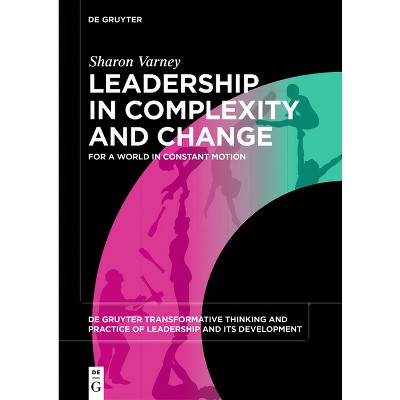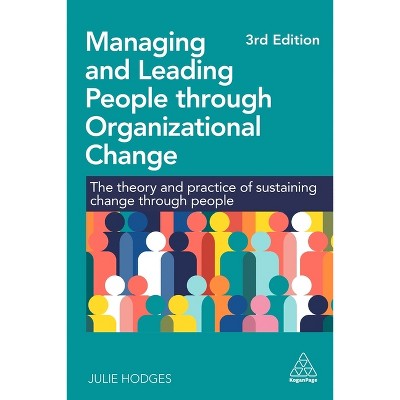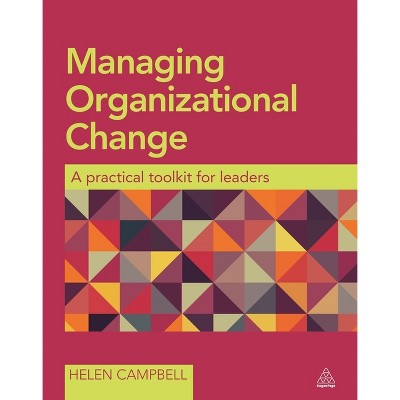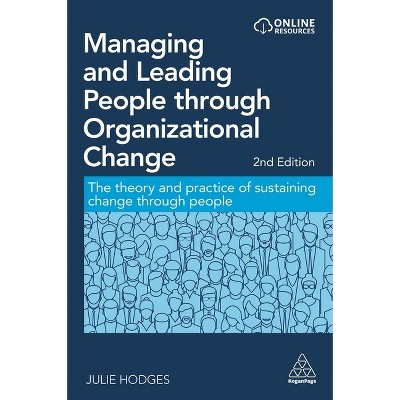Managing Legacy and Change - (De Gruyter Studies in Organizational and Management History) by Hamid Foroughi & Andrea Casey & Sonia Coman

About this item
Highlights
- The book provides insights on managing legacy and change in organizations from some of the pioneering researchers in the field.
- About the Author: Dr. Hamid Foroughi is Associate Professor of Responsible Management at Warwick Business School, University of Warwick (UK).
- 210 Pages
- Business + Money Management, Organizational Behavior
- Series Name: de Gruyter Studies in Organizational and Management History
Description
Book Synopsis
The book provides insights on managing legacy and change in organizations from some of the pioneering researchers in the field. It explores how past legacies both enable and restrict opportunities for organizational renewal, social change, and new forms of organizing. On the one hand, tangible and intangible legacies can be a source of authentication, legitimation, and strategy restoration; on the other hand, past legacies can restrict our imagination by enforcing path dependency.
Managing legacy is a vital process for both old and new organizations. Older organizations often find that their legacy is at odds with present realities or future directions. In contrast, newly formed organizations often feel they have a deficit in legacy compared with long-established organizations and seek to boost credibility by engaging in activities that can be retrospectively claimed as their legacy. In either case, when aspects of an organization's raison d'être change, the organizational identity is threatened, and legacy can become an obstacle or an opportunity.
By bringing together varied perspectives on legacy, including heritage, collective memory, rhetorical history, storytelling, and imprinting theory, this volume contributes to a deeper understanding of the interplay of legacies and imagined futures as it pertains to organizational identity and change.
Review Quotes
"This book is a remarkable contribution to the field of organizational studies. The editors are weaving together a rich tapestry of theoretical and empirical perspectives on the interplay between legacy and change. Their deep expertise and thoughtful curation shine through, as they bring together a diverse array of scholars to explore how organizations navigate their historical roots while envisioning dynamic futures. The book's exploration of topics such as organizational memory, identity, and the strategic management of legacy offers both academic rigor and practical relevance, making it an invaluable resource for researchers, students, and practitioners alike. With its compelling case studies and forward-looking insights, this book stands as a testament to the editors' dedication and the enduring importance of understanding legacy in today's ever-evolving organizational landscape."
Diana Doroftei, Head of Cybersecurity Governance, Risk and Compliance, Bose Corporation
"Managing Legacy and Change is a volume that brings fresh theoretical insight and empirical richness to the study of legacy in and around organizations. This book nicely illuminates how legacies are constructed, contested, and reimagined in the face of change. The contributions in this volume offer compelling frameworks for understanding how the past shapes organizational identity and strategic possibility providing deep insights for exploring memory, imprinting, heritage, and rhetorical history."
Tina Dacin, Professor and Chair of Strategy and Organizational Behavior at Smith School of Business, Queen's University, Canada
About the Author
Dr. Hamid Foroughi is Associate Professor of Responsible Management at Warwick Business School, University of Warwick (UK). He is an Associate Editor of Management & Organizational History and serves on the Editorial Review Board of Organization Studies (FT50 Management Journal). He is best known for his research on collective memory and organizational amnesia, with a particular focus on how institutional memory and legacy shape power dynamics, inequality, and strategic action in organizations. His work critically examines the politics of memory, exploring its links to authenticity, inclusivity, and ethics. In addition to his academic career, he has over a decade of experience as a consultant, advising organizations in the IT sector as well as in philanthropy and the non-profit sector on managing organizational legacy and heritage.
Dr. Andrea Casey is Associate Professor Emerita of Human and Organizational Learning at The George Washington University, where she taught doctoral courses in organizational culture, organizational dynamics, and research. Her research interests include organizational memory and history and identity-related theories such as organizational and professional identity. Her recent books include Organizational Identity and Memory: A Multidisciplinary Approach (Routledge) and New Directions in Organizational and Management History (De Gruyter). She has served on the Board of Governors of the Academy of Management and as Division Chair for the Managerial and Organizational Cognition Division. Before joining the George Washington University faculty, Dr. Casey was a consultant focusing on organizational change, strategic planning, and leadership development.
Dr. Sonia Coman is Vice President of Elm Street Consulting Group and Treasurer of the Board of AIBA International, a DC-based global trade association for the AI industry. She also serves as Senior Advisor to the Dean for Digital Strategy at Washington National Cathedral, where she has led the institution's digital transformation. Previously, she led Marketing and Communications at the Smithsonian's National Museum of Asian Art as Audience Engagement Strategist. Additionally, she serves on the core team of The World Innovation Network, a network of networks for Fortune 500 CEOs, entrepreneurs, and innovators. She has a PhD from Columbia University, where she brought social network analysis to bear on a transcultural art study. Dr. Coman is the co-author of the book New Directions in Organizational and Management History. Her research focuses on the intersection of art, business, and technology. She has published extensively on creativity and distinctiveness and on legacy and organizational history.






